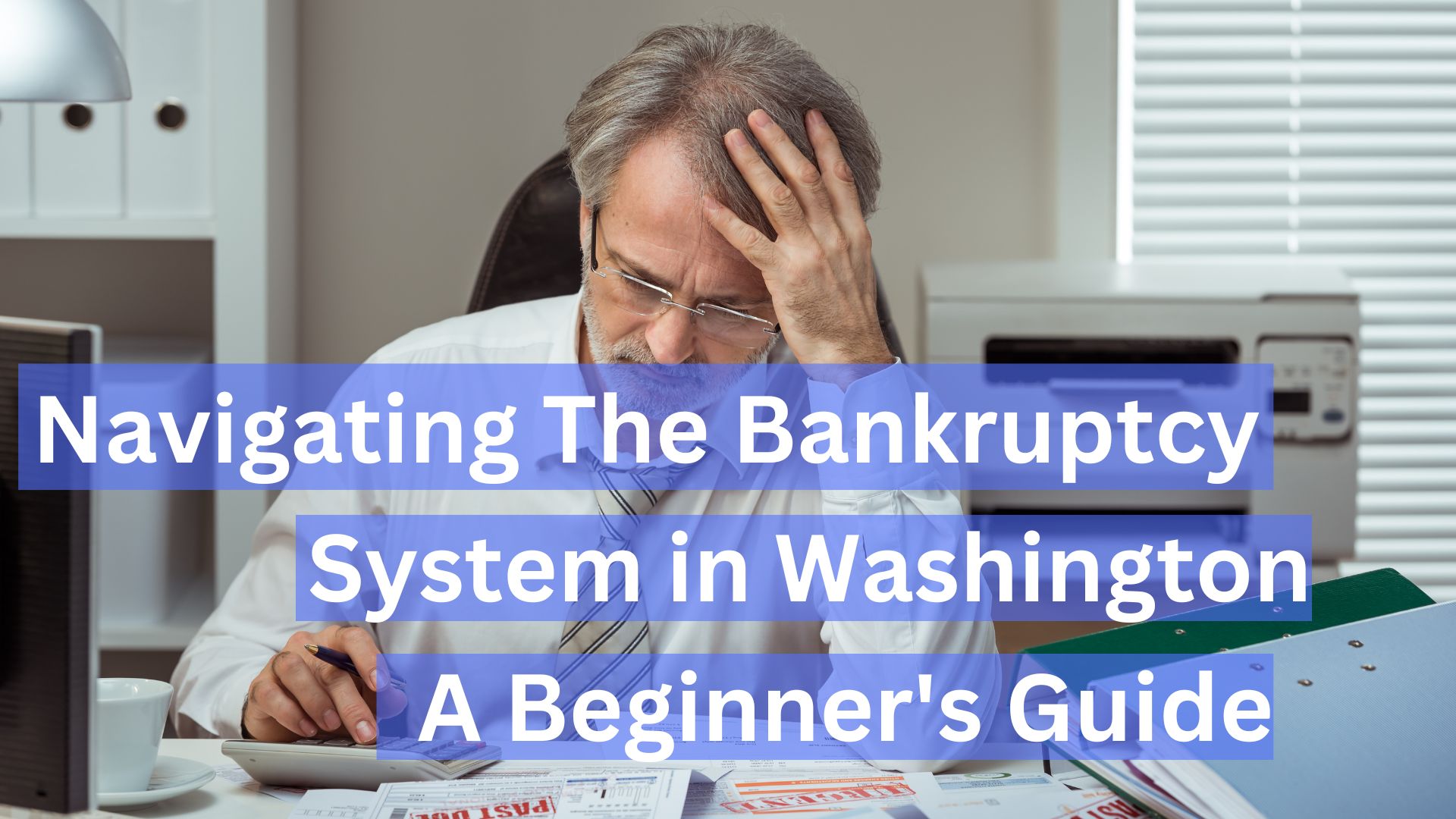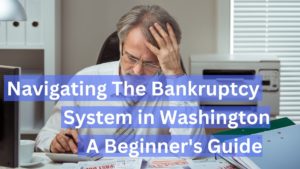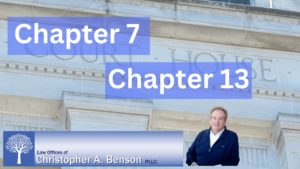
As a beginner, navigating the bankruptcy court system in Washington can seem overwhelming and confusing. Filing for bankruptcy is a complex process, and the laws surrounding bankruptcy are nuanced and intricate. However, with the right guidance, you can navigate the bankruptcy court system in Washington with confidence. In this guide, we will provide you with a comprehensive overview of the bankruptcy court system in Washington, including the different types of bankruptcy, the filing process, and what to expect in court.

Navigating the bankruptcy system. A beginner’s guide
Before Filing: Debtor Certificate of Counseling Is Required
In order to obtain bankruptcy relief and file either a Chapter 7 or Chapter 13 bankruptcy case, you must first attend a Debtor Education Course (either online, over the phone or in person) and obtain a Debtor Certificate of Counseling. The Certificate has to be filed at the time your bankruptcy case is filed with the Court.
Debtor Certificates of Counseling are valid for up to 6 months after you have completed the course.
Chapter 7 Bankruptcy
Chapter 7 bankruptcy is a type of bankruptcy that involves the liquidation of assets in order to pay off debts. This type of bankruptcy is available to individuals, married couples, partnerships, and corporations. However, you are allowed to keep certain assets during the process. The assets you are allowed to keep are called “Exemptions.” The are numerous categories for “exemptions” such as the amount of equity in your primary residence, the amount of equity in vehicles, household furnishings, retirement accounts and many other categories. “Equity” mean the dollar difference between the gross value of the asset and the amount you owe on that particular asset.
Claiming the correct exemption both for category and equity sums is crucial when filing a bankruptcy case. It is the sole responsibility of the debtor filing the bankruptcy case to make the correct exemption elections. If the debtor fails to claim an exemption on an asset, then the asset remains property of the bankruptcy estate.
The definition of “bankruptcy estate” is beyond the scope of this article. Just know that it is up to you to disclose all of your assets and all of your debts. It is up to you to properly claim an exempt asset. If you don’t, then there is a risk of you losing that asset to your creditors.
Properly claiming the right exemptions is one of the many reasons you should seriously consider hiring an experienced bankruptcy attorney to assist with the filing of your Chapter 7 or Chapter 13 bankruptcy case.
Financial Eligibility
To be eligible for Chapter 7 bankruptcy in Washington, you must pass the means test. The means test is a calculation that determines whether your income is low enough to qualify for Chapter 7 bankruptcy. If your income is higher than the Washington median income, you may still be eligible for Chapter 7 bankruptcy if your disposable income is low enough.
The “means test” is essentially a big math test. It is up to the debtor filing bankruptcy to correctly disclose all of your income. However, certain types of financial deposit are excluded from calculation of your means test eligibility.
Properly disclosing income and accurately filling out the means test math calculation is another one of the many reasons you should seriously consider hiring an experienced bankruptcy attorney to assist with the filing of your Chapter 7 or Chapter 13 bankruptcy case.
For more information on the Means Test, click on this link.
Filing Process
To file for Chapter 7 bankruptcy in Washington, you must submit a bankruptcy petition and required “Schedules”, along with supporting documentation, to the bankruptcy court. The petition must include a list of all your assets, liabilities, income, and expenses.
Once you have submitted your petition, an automatic stay goes into effect. The automatic stay prevents your creditors from taking any further action to collect on your debts including but not limited to a house foreclosure, car repossession and/or a wage garnishment.
The bankruptcy court will then appoint a trustee, who will oversee the potential liquidation of your “non-exempt” assets and the distribution of the proceeds to your creditors.
Accurately filing out the bankruptcy petition, schedules and dealing with trustee questions is another one of the many reasons you should consider hiring an experienced bankruptcy attorney to handle your bankruptcy case.
For more information on navigating the bankruptcy court system in Washington and various timelines for bankruptcy cases, click this link.

Attorney Christopher A. Benson. We help people navigate the bankruptcy court system in Washington.
What to Expect in Court
You will be required to attend a meeting of creditors, also known as a 341 meeting. During this meeting, the trustee and your creditors will have the opportunity to ask you questions about your finances and your bankruptcy case.
Prior to the meeting, you must time provide additional information to the Trustee to review in advance of your court hearing. If you do not provide complete required documentation in a timely manner to the trustee prior to the 341 meeting, your court hearing may be continued and/or your bankruptcy case dismissed.
The disclosure of the required documentation for the 341 meeting is critical to your case. You cannot obtain bankruptcy relief unless you comply with the court rules for the 341 meeting which includes among other things the documentation required by Rule 4002. The Debtor must provide 30 days of bank statements that include the date the bankruptcy case was filed, 60 days of pay stubs, a copy of the debtor’s last filed tax return and several other things if applicable such as child support order or copies of 401k retirement accounts.
Various issues can come up during the 341 meeting. This is yet another great reason to hire an experienced bankruptcy lawyer to represent you in your bankruptcy case. The bankruptcy attorney can help you respond to the bankruptcy trustee questions and ensure that the trustee receives all requested documentation in a timely manner.
If the trustee determines that your assets are not exempt, they will be liquidated and the proceeds will be used to pay off your creditors.
If the trustee determines are “exempt,” then you get to keep those assets.
Most people obtain their Discharge Order in about 60 days after the 341 Meeting.
After that, it is up to the Trustee to decide when to actually “close out” your bankruptcy case based on a variety of factors that are beyond the scope of this article.
Chapter 13 Bankruptcy
Chapter 13 bankruptcy is a type of bankruptcy that involves a reorganization of your debts. This type of bankruptcy is available to individuals, including those who are self-employed.
Eligibility
To be eligible for Chapter 13 bankruptcy in Washington, you must have a regular source of income and your unsecured debts must be less than $394,725, while secured debts must be less than $1,184,200.
The Means Test also applies to several factors in a Chapter 13. So, for people who make “too much money” under the Means Test, filing a Chapter 13 may be their only option to obtain bankruptcy relief.
Filing Process
To file for Chapter 13 bankruptcy in Washington, you must submit a bankruptcy petition, along with schedules and supporting documentation to the bankruptcy court just like set forth above for a Chapter 7 case. The debtor must include a proposed repayment plan, which outlines how you will handle your debts over a period of three to five years. That plan make include making a partial payment to creditors or a full repayment. What Plan works for you varies greatly depending on numerous factors beyond the scope of this article.
Once again, this a great reason to hire a bankruptcy lawyer to assist you navigating the bankruptcy court system and figuring out a Plan that will satisfy both bankruptcy law and your creditors.
Once you have submitted your petition, an automatic stay goes into effect, which prevents your creditors from taking any further action to collect on your debts. The court will then appoint a trustee, who will oversee the administration of your bankruptcy case and the distribution of your payments to your creditors.
What to Expect in Court
You will be required to attend a confirmation hearing, during which the court will review your proposed repayment plan and determine whether it is feasible and fair to your creditors.
The 341 Meeting is very similar to a 341 meeting conducted in a Chapter 7 case set forth above.
After that, a Confirmation Hearing will be scheduled to determine if your Plan is acceptable by the Court, the Chapter 13 Trustee and your creditors.
Once again, this is another great reason to hire a bankruptcy attorney to handle your Plan Confirmation Hearing.
Once your repayment plan has been approved, you will be required to make regular payments to the trustee for the duration of the plan.
Once your repayment plan has been completed, any remaining debts will be discharged, and your case will be closed.
Conclusion
Navigating the bankruptcy court system in Washington can be complex and overwhelming. However, with the right guidance and understanding of the bankruptcy process, you can successfully file for bankruptcy and get financial relief.
For additional information, please look at our website located at www.cbenson.com and watch our informational videos.
Author: Attorney Christopher A. Benson
Law Offices of Christopher A. Benson, PLLC
1814 S 324th Pl Suite B, Federal Way, WA 98003
(253) 815-6940